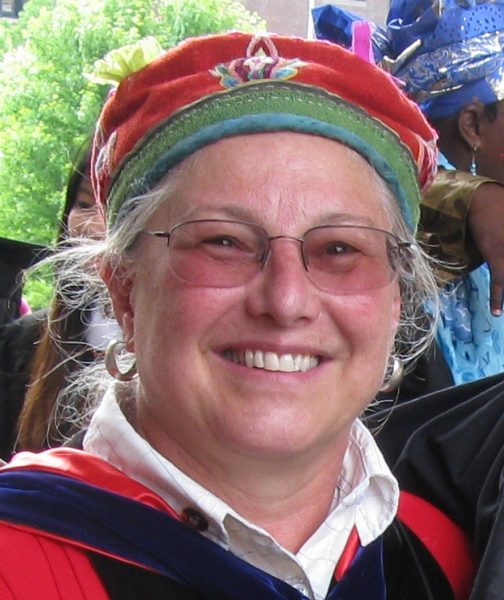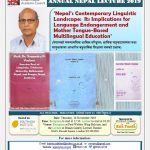Annual Lectures Britain - Nepal Academic Council › Activities › Annual Lectures
Latest News
Registration and Draft Conference Programme: BNAC Nepal Study Days, 24-25 April 2025Registration and Draft Conference Programme: BNAC Nepal Study Days, 24-25 April 2025 The registratio...
Read More20th BNAC Annual Nepal Lecture, Thursday, 3 Nov 2022, SOAS, London
October 04, 2022Beyond sex and gender in a career of engagement with Nepal
Kathryn S. March is Graduate Professor and Professor Emerita of Anthropology, Feminist/Gender/Sexuality Studies, and Public Affairs at Cornell University
Date: Thursday, 3 November 2022
Time: arrival at 1730; lecture starts at 1800
Venue: SOAS (room: Alumni Lecture Theatre)
SOAS, Russell Square, London WC1H 0XG
Registration: https://www.eventbrite.com/e/20th-bnac-annual-lecture-tickets-427265621977
Abstract
My engagement with Nepal has been driven by two forces. First is the desire to understand how and why, even whether, men and women have substantially different lives with divergent opportunities and meanings; and second is the aspiration to apply this knowledge to change, specifically to produce greater social justice and equity for women and men. In this presentation, I will explore some of what I have learned from almost 50 years of work on sex, gender, and social change in Nepal. I will try to show how this work has evolved over these pivotal years in the anthropology of sex and gender. Examples will be drawn primarily, but not exclusively, from ethnographic fieldwork among Western Tamang in the Kispang Gaun Palika region, in the context of equally pivotal years of change in Nepal.
Biography:
Kathryn S. March is Graduate Professor and Professor Emerita of Anthropology, Feminist/Gender/Sexuality Studies, and Public Affairs at Cornell University, where she received her PhD in 1979. She first went to Nepal in 1973 and has lived with indigenous Tibeto-origin peoples in the Himalayas, specifically the Sherpa and Tamang, and worked on questions of gender, social justice and change, since 1975.
Her published work includes a study about the empowerment and mobilization of women—Women’s informal associations: catalysts for change? (with R. Taqqu, 1985), a collaborative book in both Nepali and English about first-hand travel experiences called Mutual Regards/दोहोरी नमस्ते (with D. Holmberg, B.B. Tamang & S.M. Tamang, 1994) and a collection of women’s life history narratives and song compositions in “If each comes halfway”: meeting Tamang women in Nepal (2002), as well as many articles.
She has received grants and fellowships, notably from the National Science Foundation, National Institute of Mental Health, Woodrow Wilson Foundation, Mellon Foundation, National Endowment for the Humanities, and the Bunting Institute. Twice a Fulbright Scholar to Nepal, she also founded the Cornell-Nepal Study Program, a collaborative initiative with the national Tribhuvan University of Nepal in 1992, which supported study and research on a wide variety of subjects by approximately 25 young scholars from both the US and Nepal annually from 1992-2015. She has worked with UN/FAO, SNV-Nepal, USAID, the US Department of State, and various Nepal government ministries, including a consultation on gender management for the National Planning Commission.
Her commitments to teaching won her a Stephen and Margery Russell Distinguished Teaching Award, the Cornell Institute of Public Affairs Distinguished Faculty Award, and (twice) the Merrill Presidential Scholar Outstanding Educator award; for her work in international women’s rights, she was (twice) Cornell’s International Women’s Day Honoree, as well as being honored by the Tamang Society of America.
Her current research focuses on the changes in Tamang gender, precipitated by the extensive wage labor migration that has taken two-thirds of the working-age men and boys out of the village community, with more and more women now following. Since the great earthquakes of April 2015, she has, as well, worked to mitigate and understand their impact, especially in the Tamang communities on Phyukhri Ridge in the Rural Municipalities of Kispang (Nuwakot) and Uttargaya (Rasuwa)
Kath is the eldest daughter of two very loving parents who also gave her three younger brothers and two foster exchange sisters—one in France and the other in Thailand. She went to high school in Pennsylvania, California, and herself as an AFS exchange student in Belgium, before going to college at Stanford. There she discovered anthropology, which she continued in graduate school at the University of Washington, where she met David Holmberg, who convinced her to work in the Himalayas. Together, they came to Cornell in 1973 and began what has become almost 50 years of work and friendship in Nepal. With their two children—Mohan and Maya, both of whom are adopted from Nepal—they have travelled and lived in Nepal many times.
In 2021, David Holmberg and Kathryn March were jointly honored as recipients of the Sir Edmund Hillary Mountain Legacy Medal “for remarkable service in the conservation of nature and the equitable advancement of human welfare in mountainous regions.”



